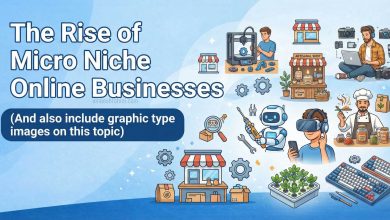How to Become an Affiliate Marketer in 2025 – Comprehensive Guide
How to Become an Affiliate Marketer : Affiliate marketing has emerged as one of the most popular and effective ways to earn passive income online. It involves promoting products or services on behalf of companies and earning a commission on each sale or action taken by a visitor who clicks through an affiliate link. This business model has gained immense popularity due to its flexibility and scalability, making it attractive for people who want to earn from home, diversify their income, or even start a full-fledged business.
Table of Contents
If you’re interested in becoming an affiliate marketer, this comprehensive guide will walk you through the steps, from understanding the basics to implementing effective strategies for success.
1. Understanding Affiliate Marketing

Affiliate marketing is a performance-based business model where affiliates (you) earn a commission for generating sales, leads, or clicks for a merchant or advertiser. The process typically involves three main parties:
- Merchant/Advertiser: The company that owns the product or service.
- Affiliate/Publisher: The person or business that promotes the merchant’s product in exchange for a commission.
- Consumer: The end-user who clicks on the affiliate link and completes the desired action, such as making a purchase.
The affiliate earns a commission based on the agreed terms with the merchant, and this is usually paid as a percentage of sales, a flat fee, or cost-per-action (CPA).
2. Choosing Your Niche
Selecting a niche is a crucial first step. Your niche will determine the products or services you’ll promote, the type of audience you’ll target, and the content you’ll create. Here’s how to choose a niche:
- Identify Your Interests and Expertise: If you’re passionate about a particular topic, you’re more likely to stay motivated and create engaging content.
- Research Profitability: Not all niches are equally profitable. Look for niches with products that offer higher commission rates or have a proven demand.
- Analyze Competition: While a competitive niche can indicate profitability, too much competition can make it hard to stand out. Aim for a niche with a balance of demand and achievable competition.
Examples of profitable niches include health and wellness, finance, technology, lifestyle, and education.
3. Finding the Right Affiliate Programs
After choosing a niche, the next step is to find affiliate programs that offer products or services you’re interested in promoting. Here are the types of affiliate programs available:
- In-house Programs: Some companies run their affiliate programs directly. These companies, such as Amazon, eBay, and Shopify, offer dedicated affiliate programs with varying commission rates and terms.
- Affiliate Networks: These are platforms that connect affiliates with multiple companies. Popular networks include ShareASale, Commission Junction (CJ), ClickBank, and Rakuten. Networks often have a wide range of products across different niches.
- Pay-per-click (PPC) Affiliate Programs: These programs pay affiliates for clicks generated through their links. Although rare, PPC programs can be suitable if you have a high-traffic website.
When selecting a program, consider factors like commission rates, payment structure, product relevance to your niche, and the credibility of the merchant.
4. Building Your Platform

Your platform is where you’ll promote affiliate products. Most affiliate marketers use a combination of the following platforms:
- Website/Blog: A website or blog is essential for long-term success. Blogging allows you to publish reviews, guides, and other content that can rank in search engines and attract organic traffic.
- YouTube: Video content is powerful for affiliate marketing. Many marketers use YouTube to review products or create “how-to” videos, including affiliate links in video descriptions.
- Social Media: Platforms like Instagram, Facebook, Twitter, and TikTok are excellent for building a following and promoting products. Be mindful to disclose affiliate links to maintain transparency with your audience.
- Email Marketing: Building an email list is a great way to promote affiliate offers directly to your subscribers. You can provide valuable information and include affiliate links within the emails.
Also Read : 10 Best Online Business Ideas in India 2024
5. Creating Quality Content
Content is the backbone of affiliate marketing. To succeed, you need to create valuable content that attracts and engages your target audience. Here are some types of content that work well for affiliate marketing:
- Product Reviews: Write detailed, honest reviews of products you’ve used or researched. Include both pros and cons to build trust.
- How-to Guides and Tutorials: Guides on using a product or solving a specific problem can be helpful and drive engagement. Including affiliate links to relevant products within the guide can lead to conversions.
- Comparison Posts: Comparing similar products is useful for buyers who are deciding between multiple options. For instance, you could compare two popular gadgets or services in your niche.
- Listicles: Lists such as “Top 10 Tools for Bloggers” or “Best Fitness Equipment” work well because they are easy to read and can cover multiple affiliate products.
Each piece of content should provide real value to the reader. Focus on educating, entertaining, or solving a problem, and weave in affiliate links naturally.
6. Driving Traffic to Your Content
Without traffic, even the best content won’t lead to conversions. Here are some strategies to attract visitors:
- SEO (Search Engine Optimization): Optimizing your content for search engines can help attract organic traffic. Research relevant keywords and use them strategically in your content. Additionally, optimize page loading speeds and mobile responsiveness.
- Social Media Marketing: Use social media to share your content, interact with followers, and build brand awareness. Tailor your content for each platform to maximize engagement.
- Email Marketing: By capturing visitors’ emails, you can build a subscriber list and send out newsletters with affiliate links and promotions.
- Paid Advertising: If you have the budget, consider investing in paid ads (Google Ads, Facebook Ads, etc.) to reach a wider audience. Paid advertising can yield quick results but requires careful targeting and budgeting.
7. Converting Traffic to Sales
Once you have traffic, the next challenge is turning visitors into buyers. Conversion optimization is a process where you refine your strategies to maximize the percentage of visitors who complete a desired action.
- Create Compelling Calls-to-Action (CTAs): CTAs guide readers to take the next step. Use persuasive language and make it clear what readers should expect if they click the link.
- Optimize for Mobile Users: A significant amount of internet traffic comes from mobile devices. Ensure your website and links are mobile-friendly.
- A/B Testing: Test different versions of your content, CTAs, and page layouts to see what performs best. Sometimes small adjustments can significantly impact conversions.
- Use Retargeting Ads: Retargeting ads help bring visitors back to your site by reminding them of products they viewed earlier. This can increase conversion rates.
8. Tracking and Analyzing Performance

Tracking is vital in affiliate marketing. To understand what’s working and what isn’t, you’ll need to track your performance:
- Use Analytics Tools: Google Analytics and other tracking tools can show you how users interact with your site. This data is essential for refining your strategy and improving conversion rates.
- Monitor Affiliate Program Dashboard: Most affiliate programs offer a dashboard where you can track clicks, conversions, and earnings. Regularly check these insights to adjust your approach as needed.
- Optimize Based on Data: If you find that certain content types or products convert better, focus on creating more of that content or promoting similar products.
9. Scaling Your Affiliate Marketing Business
Once you’ve achieved some success, it’s time to scale your business to increase your earnings. Here’s how:
- Diversify Affiliate Programs: Partner with additional programs in your niche or related niches to diversify your income streams. Having multiple programs can also reduce the risk of being overly reliant on one.
- Expand Your Content Reach: Increase the quantity and quality of your content. Consider collaborating with other content creators or using guest posts to reach new audiences.
- Outsource Tasks: As your business grows, you may need help. Hiring writers, graphic designers, or virtual assistants can free up time to focus on strategy and growth.
- Leverage Paid Traffic: Paid advertising can help accelerate growth. Once you have a proven strategy, investing in ads can yield more conversions.
- Experiment with High-Ticket Offers: High-ticket offers are products with higher commission rates, but they can require more persuasive marketing. These can include premium memberships, courses, or software.
10. Staying Compliant and Ethical
Transparency is crucial in affiliate marketing. Most regions require affiliates to disclose their relationship with the merchant, so make sure to comply with these requirements to avoid legal issues and maintain trust with your audience.
- Disclose Affiliate Links: Clearly inform readers when your links are affiliate links, either at the beginning of the content or immediately next to the link.
- Follow Guidelines: Adhere to the guidelines of the affiliate program and any advertising platform you use.
- Stay Honest: Only recommend products you genuinely believe in. Misleading promotions may lead to short-term gains but will damage your reputation and long-term success.
How to Become an Affiliate Marketer : Conclusion

Becoming an affiliate marketer requires a combination of creativity, strategic planning, and continuous learning. Start by understanding the fundamentals, choosing the right niche, and building a strong platform. Then, create quality content, focus on driving targeted traffic, and convert that traffic into sales by optimizing your strategies. Remember, success in affiliate marketing doesn’t happen overnight, but with consistency and perseverance, you can create a lucrative income stream.
Buy Now : Online Jobs Mastery – Hand Book
Affiliate marketing is an exciting journey with vast opportunities. By following these steps, staying committed, and adapting to industry trends, you’ll be well on your way to achieving success in the world of affiliate marketing.
Keywords : How to Become an Affiliate Marketer – How to Become an Affiliate Marketer 2024 – How to Become an Affiliate Marketer 2025



